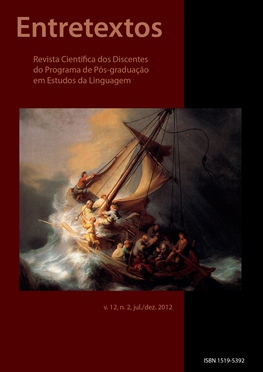The significance as a theme in literature
DOI:
https://doi.org/10.5433/1519-5392.2012v12n2p7Keywords:
Meaning, Word Phármakon, LiteratureAbstract
This article aims to discuss issues related to the meaning of linguistic forms in literary works. To this end, we discuss how this occurs in a stretch of Cem anos de solidão by Gabriel García Márquez and the tale Famigerado by Guimarães Rosa. The chosen texts serve as a starting point for discussing pragmatic aspects involved in significance as the meaning is established in the interaction. The text of Guimarães Rosa is useful to itself in order to reflect on the word concept of phármakon. The purpose is to show that the word is not just a raw material of literary work, but also its theme, particularly with regard to questions of a semantic nature. The choice in treating meaning in literature is justified by the high polysemous load of the literary text and the fact that it often questions the word and its meaning. The question we intend to answer is: How do literary texts thematize significance? The theoretical input focused on Ogden and Richards, and Fedro platonic, particularly in hisrereading made by Derrida on A farmácia de Platão. The results showed that the double sense of the words is hihh the theme category of work.Downloads
References
BAKHTIN, Mikhail. (Volochinov). Marxismo e filosofia da linguagem. 9. ed. São Paulo: Annablume; Hucitec, 2002.
BOSI, Alfredo. Situações e formas do conto brasileiro contemporâneo. In: BOSI, Alfredo (Org.) O conto brasileiro contemporâneo. São Paulo: Cultrix; Editora da Universidade de São Paulo, 1975. p. 7-22.
BRÉAL, Michel. Ensaio de semântica: ciência das significações. São Paulo: EDUC, 1992.
DERRIDA, Jacques. A farmácia de Platão. 3. ed. São Paulo: Iluminuras, 2005.
DETIENNE, Michel; VERNANT, Jean-Pierre. Les ruses de l’intelligence la métis des Grecs. Paris: Flammarion, 1974.
FERREIRA, Vergílio. O poder da palavra. Disponível em: http://portuguesonline.no.sapo.pt/palavramagica.htm. Acesso em: 9 nov. 2012.
JOLLES, André. Formas simples. São Paulo: Cultrix, 1976.
LYONS, John. Semántica. Barcelona: Teide, 1977.
MANGUEL, Alberto. A cidade das palavras: as histórias que contamos para saber quem somos. São Paulo: Companhia das Letras, 2008.
MÁRQUEZ, Gabriel García. Cem anos de solidão. 41. ed. Rio de Janeiro: Record, 1995.
MAUPASSANT, Guy de. O vagabundo. In: MAUPASSANT, Guy de. 125 contos de Guy de Maupassant. São Paulo: Companhia das Letras, 2009. p. 663-674.
OGDEN, Charles Kay; RICHARDS, Ivor Armstrong. O significado de significado. Rio de Janeiro: Zahar Editores, 1972. PLATÃO. Crátilo. Lisboa: Instituto Piaget, 2001.
PLATÓN. Fedón/ Fedro. Madri: Alianza Editorial, 2005.
ROSA, João Guimarães. Famigerado. In: ROSA, João Guimarães. Ficção completa Volume II. Rio de Janeiro: Nova Aguilar, 1995. p. 393-396.
ROSENBAUM, Yudith. A palavra como enigma. In: Aletria jan.- jun. Belo Horizonte: 2006.
SÓFOCLES. Antígona. Porto Alegre: L&PM, 1999.
SWIFT, Jonathan. Viagens de Gulliver. São Paulo: Abril Cultural, 1979.
Downloads
Published
How to Cite
Issue
Section
License
Entretextos adota a Licença Creative Commons Attribution 4.0 International, portanto, os direitos autorais relativos aos artigos publicados são do(s) autor (es).
Sob essa licença é possível: Compartilhar - copiar e redistribuir o material em qualquer suporte ou formato. Adaptar - remixar, transformar, e criar a partir do material, atribuindo o devido crédito e prover um link para a licença e indicar se mudanças foram feitas.




















